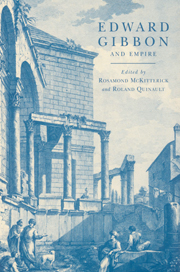Book contents
- Frontmatter
- Contents
- List of contributors
- Preface
- List of abbreviations
- Introduction
- 1 Gibbon and the later Roman Empire: causes and circumstances
- 2 Gibbon and Justinian
- 3 Gibbon and the middle period of the Byzantine Empire
- 4 Byzantine soldiers, missionaries and diplomacy under Gibbon's eyes
- 5 Gibbon and the later Byzantine Empires
- 6 Gibbon and the Merovingians
- 7 Gibbon, Hodgkin, and the invaders of Italy
- 8 Gibbon and the early Middle Ages in eighteenth-century Europe
- 9 Gibbon and the ‘Watchmen of the Holy City’: revision and religion in the Decline and fall
- 10 Gibbon and international relations
- 11 Gibbon's Roman Empire as a universal monarchy: the Decline and fall and the imperial idea in early modern Europe
- 12 The conception of Gibbon's History
- 13 Winston Churchill and Gibbon
- Epilogue
- Index
1 - Gibbon and the later Roman Empire: causes and circumstances
Published online by Cambridge University Press: 02 December 2009
- Frontmatter
- Contents
- List of contributors
- Preface
- List of abbreviations
- Introduction
- 1 Gibbon and the later Roman Empire: causes and circumstances
- 2 Gibbon and Justinian
- 3 Gibbon and the middle period of the Byzantine Empire
- 4 Byzantine soldiers, missionaries and diplomacy under Gibbon's eyes
- 5 Gibbon and the later Byzantine Empires
- 6 Gibbon and the Merovingians
- 7 Gibbon, Hodgkin, and the invaders of Italy
- 8 Gibbon and the early Middle Ages in eighteenth-century Europe
- 9 Gibbon and the ‘Watchmen of the Holy City’: revision and religion in the Decline and fall
- 10 Gibbon and international relations
- 11 Gibbon's Roman Empire as a universal monarchy: the Decline and fall and the imperial idea in early modern Europe
- 12 The conception of Gibbon's History
- 13 Winston Churchill and Gibbon
- Epilogue
- Index
Summary
Having reached the surrender of Carthage to the Vandals in the year 439, Gibbon ended chapter 33 of Decline and fall by telling the ‘memorable fable of the seven sleepers, whose imaginary date corresponds with the reign of the younger Theodosius and the conquest of Africa by the Vandals’. Gibbon was not the last philosophic mind to feel the fascination of the story, and that he was not the first is attested by his own erudite tracing of the legend and its variants from Syriac and Latin versions to the Koran and among Muslim nations from Bengal to Africa, even in the ‘remote extremities of Scandinavia’, not to mention the inscription of the saints' names in the Roman, Abyssinian and Russian calendars. It told of the martyrdom of seven young men of Ephesus under the emperor Decius by their immolation in a cave which was then blocked by stones. The young men fell asleep, and were wakened, it seemed after a few hours, when someone opened the cave and let in the sunlight. They sent one of their number to town to buy bread, but he found that he could no longer recognize the country; the main gate of Ephesus was, to his amazement, surmounted by a large cross. His odd dress and old-fashioned speech equally surprised an Ephesian baker, to whom the young man, in an episode that should interest numismatists, offered a coin of Decius as current exchange.
- Type
- Chapter
- Information
- Edward Gibbon and Empire , pp. 12 - 33Publisher: Cambridge University PressPrint publication year: 1996
- 2
- Cited by



